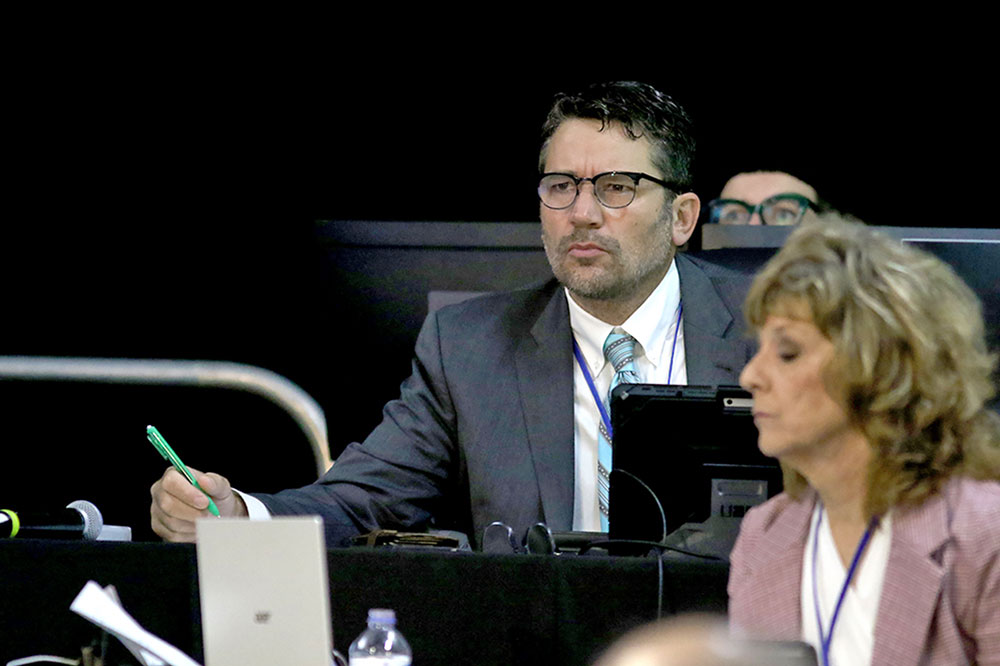Former Comet baseball player Theo Arndt now is a professional umpire

Former Charles City Comet and Wartburg College baseball player Theo Arndt now umpires professionally at the Class A level amid the Major League Baseball-affiliated minor leagues.
By John Burbridge
sports@charlescitypress.com
CHARLES CITY — Theo Arndt knows the maxim by heart.
“Don’t make the game about you,” he says about the responsibilities and rigors that come with being an umpire.
“Know your role and respect the game.”
Arndt has grown up respecting the game. He has been involved with baseball for most of his life, dating back from his formative youth league playing days and through his prep tenure as an all-conference outfielder/pitcher for the Charles City Comets that led to him signing to continue his career at Wartburg College.
Even during his scholastic playing days, Arndt would often volunteer umpire for local youth play, and then later for high school.
Now, Arndt is umpiring at the professional level.
It got to this point after Arndt made the brave call to more vigorously pursue his passion to stay in the game when he enrolled at a prestigious umpiring school in Vero Beach, Florida last spring.
“I learned so much that I didn’t know before,” Arndt said. “Little things … like how to position yourself before cleaning the plate … how to project confidence whenever you take the field and whenever you make a call.”
The experience paid off as Arndt was subsequently hired by Minor League Baseball in conjunction with the MLB to umpire for the California League, which includes Class A and Rookie level affiliated teams.
Arndt obviously has the dream of reaching “the show” like the players he presides over. But his path to the majors may be even more difficult. Major League umpires have a strong union and — once they reach the “bigs” — are often able to retain their jobs due to far less turnover compared to that of players and coaches, thus openings occur less frequently.
“It usually takes about 8 or 10 years to reach the major league level,” Arndt said. “The youngest (MLB) umpires are around 32 years old.”
But though the MLB doesn’t often open doors for young umpires still in their 20s, the level Arndt is now working can come with the fraught warning: No Country for Old Men.
“With two-men crews in Rookie ball, you’ve got to cover a lot of ground,” said Arndt, who exercises and watches his diet in the same pious manner as during his playing days.
“As you move up, the less ground you have to cover. But you’ve got to be able to move if you want to move up.”
And you’ve got to love the game, even though the game — or rather players/coaches/fans — don’t always love you back.
“I try to be decisive with my calls … go with my first instinct,” he said. “If I miss a pitch or call, I try to put it behind me before the next pitch.
“Many games are ball, strike, out, safe to where most anyone can umpire them. Much fewer games have those crucial calls or rulings that cause controversy and arguments. But if the worst thing that happens to me during a day is getting yelled at a baseball game … I can live with that.”
Still, the abuse can be daunting, especially with such over-the-top episodes getting played more regularly on social media. Such a trend may be the prime reason fewer people want to “step to the plate” to become umpires, but Arndt counters with some of the positives.
“For any high school or college student who wants to earn money during the summer, I can’t think of a better summer job,” he said. “Not only can you make good money, but you learn so many life skills … how to take control of a situation while staying in control yourself … how to deal with people.”
Arndt comes from a baseball-laden family. He and his younger brother, Tait, were teammates at Charles City and were briefly teammates at Wartburg. When asked if he tried to recruit his brother to the umpiring ranks, Arndt said, “He was more of a pitcher, so he doesn’t like umpires that much. He’s more into coaching.”
Talk of umpires being replaced in some capacity by artificial intelligence periodically becomes the “rhubarb” of the day. But Arndt makes a case for the reliability the human eyes and the human ears working in concert with each other in determining a “bang-bang” call.
“For a close call at first base, I don’t just look at the foot hitting the base and the ball hitting the glove — I listen for them.”








Social Share